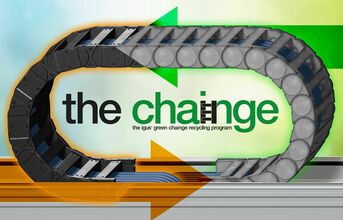
Everything from a single source: igus takes care of both the assembly of new e-chains and the return transport and recycling of discarded energy chains as part of the chainge programme
Since 2019, igus has been using its chainge recycling programme to give old energy chains a new life. Now, the motion plastics specialist is taking things a step further. To avoid industrial waste, igus is organising return delivery of worn-out energy chains - and returning them to the material cycle. Recycling begins at assembly.
Sooner or later, every machine and component reaches the end of its service life. Manufacturing companies then face the question of whether to modernise or acquire new equipment. Sustainability plays an increasingly important role here. After all, according to the Global E-waste Monitors, 53.6 million tons of electronic waste were generated worldwide in 2019 alone. A more environmentally friendly upgrade for old machines is the so-called retrofitting. Instead of buying new machines, companies can have existing equipment converted or refurbished to meet the latest standards. However, this does not solve the problem of where to put discarded components.
Recycling made easy: the igus installation service picks up old material
For new installation, retrofitting, or maintenance, igus focuses on recycling instead of disposal - starting way back in assembly planning. The recycling service is offered automatically with each new assembly order and entails no additional costs or effort for the customer. igus takes care of the scrap material in four simple steps: first, igus removes the worn-out energy chain, then disassembles it into smaller pieces and packs it into big bags. Finally, igus organises the return transport and logistics. The installation coordinator commissions the forwarding company, which collects the discarded energy chains. That way, the customer has only to provide the scrap material for collection and load it. It is then taken away and recycled as part of the igus chainge programme. This service is offered for both igus e-chains and chains from other manufacturers. Customers receive a voucher-based on the weight of the chains. The discarded plastics are separated by type, cleaned and re-granulated so that the material can be reused.
The igus installation service saves customers installation time and costs. The customer gets everything from a single source (the manufacturer), including a 36-month guarantee on newly installed energy supply systems. They also benefit from very short downtimes and longer service life. This means that in the long term, they suffer fewer failures. A special online tool even enables users to calculate the exact installation time for their energy chain system. "It is the goal of igus to save customers valuable time with the installation service while offering them a sustainable solution for disposing of old material. This measure is intended to further contribute to more sustainable use of limited resources", says Michael Berteit, Engineering Projects and Assembly Service Sales Manager at igus.
igus recycling programme picks up speed
igus, which specialises in high-performance polymers, has launched chainge, a recycling programme for energy chains, which has already collected and recycled 32.3 tons of material worldwide. So far, 13 countries have participated in the programme: Germany, the Netherlands, the UK, Poland, France, China, Italy, Brazil, Malaysia, Hungary, Croatia, the Czech Republic and Spain - with the majority of returns coming from Germany and China. "We are very pleased that the recycling programme is proving very popular with our customers, and are confident that in 2022, we will be able to double at least what we have achieved so far", adds Michael Berteit. igus uses the chainge programme to return old plastics to the material cycle, systematically promoting the circular economy.



























